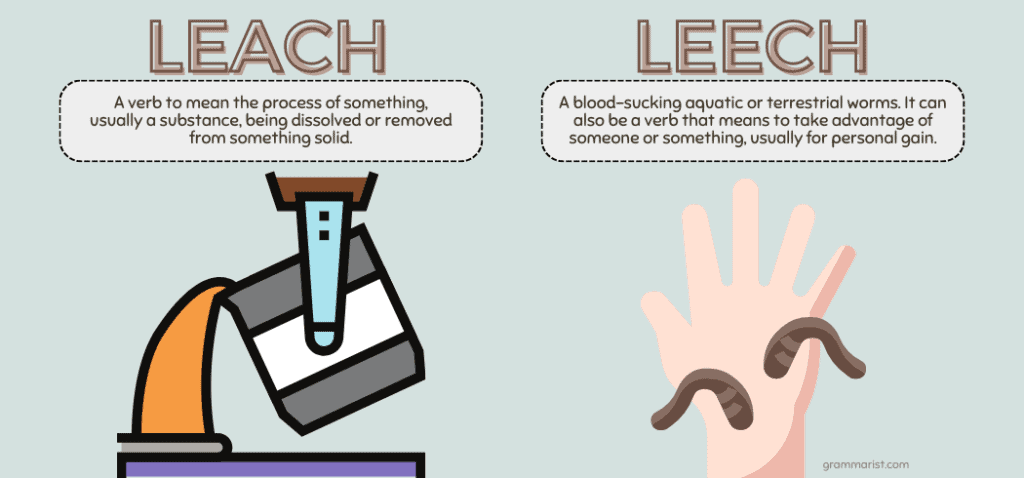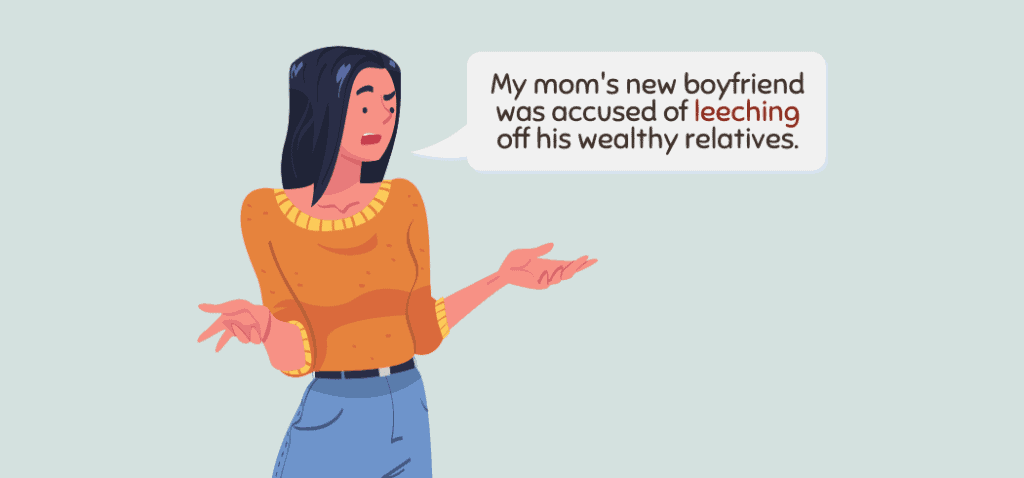Do you know the difference between leech and leach? Not many do, so don’t feel bad. Homophones can be tough for anyone, even pro-English speakers. But I’ll quickly show you the main difference between leech and leach right here, so you never have to wonder again.
Leach vs. Leech: What’s the Difference?

The biggest difference between “leach” and “leech” is mostly in their meanings. “Leach,” with an A and E in the middle, is considered a verb to mean the process of something, usually a substance, being dissolved or removed from something solid.
Take granite, for example. While the natural stone makes a beautiful countertop, it was discovered that most granite leaches radiation. The verb leach shows how the radiation seeps from it.
Another instance where you could use the word leach is in gardening. When we get heavy rainfalls, a lot of nutrients leach from the soil, aka get washed away.
Then we have the noun “leech,” which is one we use to refer to those nasty, blood-sucking aquatic or terrestrial worms. Funnily enough, it can also be a verb that means to take advantage of someone or something, usually for personal gain. A good example would be when one person enters a relationship just for financial gain and takes their money; they’re leeching their spouse’s money.
Is It Leeching or Leaching?
The correct term you’ll use depends on the context at hand. If you’re referring to the process of something being dissolved or washed from a solid material, you should use “leaching.”
But, if you’re talking about the act of taking advantage of someone or something, or the behavior of a blood-sucking worm, then you’d use “leeching.”
How Do You Spell Leech?
“Leech” should be spelled with the letters l-e-e-c-h. Whether in noun or verb form, it’s spelled the same way.
Leech as a Verb and a Noun
As a noun, “leech” is the type of worm that feeds on the blood of humans and other animals. You find them in wet, dark environments. As a kid growing up in rural Newfoundland, we’d swim in lakes and ponds, and at least one of us would walk home with a leech somewhere on our bodies.
But, in verb form, the word “leech” means exploiting or taking advantage just for your own gain, usually without providing anything to the other person in return.
Leech Examples in a Sentence

- The medical team at James Payton used leeches to reduce swelling in the patient’s injured limb to prevent blood clots.
- Some ancient people and cultures, like Egyptians, believed leeches had healing properties.
- Our old store manager was well-known for leeching off the hard work of the rest of us without giving us any credit.
- I can’t believe my mom’s new boyfriend was accused of leeching off his wealthy relatives.
Leach Examples in a Sentence
- The heavy rainfall we just had caused nutrients to leach from the soil in our garden, so now we have to fix that before we start planting.
- Over time, the chemicals in the landfill began to leach into the groundwater that the people used as their drinking source.
- In Science class today, we used an acidic solution to leach the metal from ore.
- In some cases, improper storage containers can cause contaminants like BPA to leach into your food.
It’s Not Potato-Potatoe
So, while I know leech and leach sound alike and even look similar, as you can see from my guide, they hold different meanings. Understanding the different forms for each will help you insert them in the right contexts while writing.

Comments are closed.